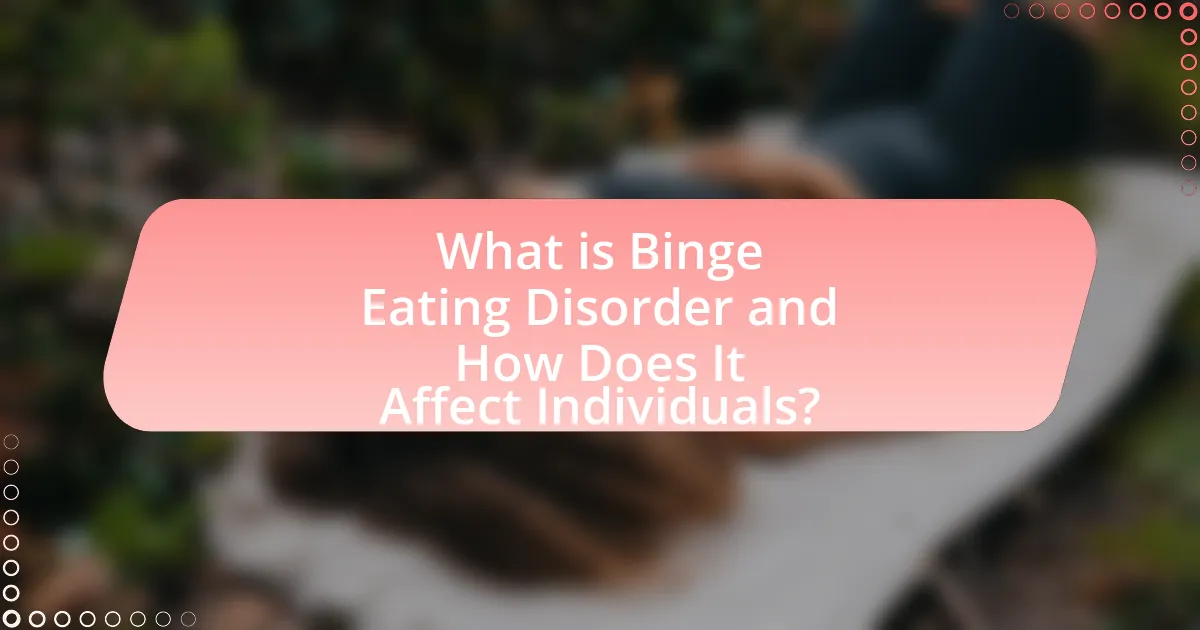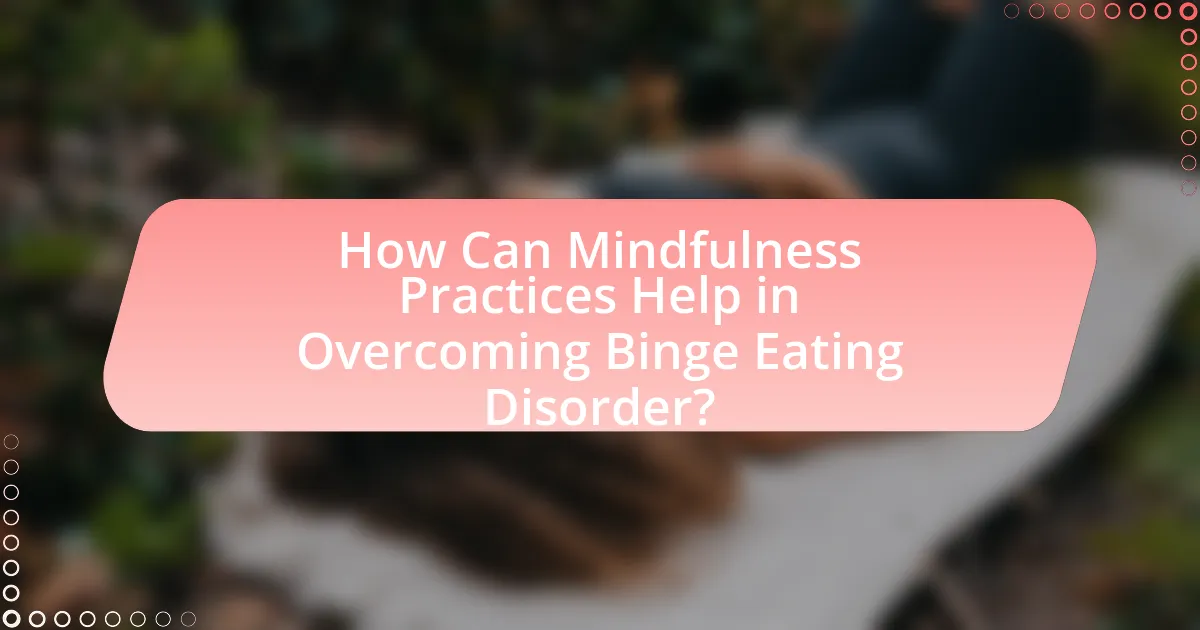Binge Eating Disorder (BED) is a prevalent psychological condition marked by recurrent episodes of consuming large amounts of food, often leading to feelings of loss of control and distress. This article explores the symptoms, psychological and environmental factors contributing to BED, and the diagnostic criteria used by healthcare professionals. It emphasizes the role of mindfulness practices in managing and overcoming BED, detailing how techniques such as mindful eating and meditation can enhance self-awareness and emotional regulation. Additionally, the article addresses common challenges individuals face when implementing mindfulness and offers practical tips for integrating these practices into daily routines to support recovery.

What is Binge Eating Disorder and How Does It Affect Individuals?
Binge Eating Disorder (BED) is a psychological condition characterized by recurrent episodes of eating large quantities of food, often quickly and to the point of discomfort, accompanied by feelings of loss of control and distress. Individuals with BED may experience significant emotional and physical consequences, including obesity, anxiety, depression, and low self-esteem. Research indicates that approximately 2-3% of the population suffers from BED, making it the most common eating disorder in the United States. The disorder can lead to serious health issues, such as diabetes and cardiovascular disease, due to the associated patterns of overeating and poor dietary habits.
What are the symptoms of Binge Eating Disorder?
The symptoms of Binge Eating Disorder include recurrent episodes of eating large quantities of food in a short period, a sense of loss of control during these episodes, and experiencing distress regarding binge eating. Individuals may also exhibit behaviors such as eating rapidly, eating until uncomfortably full, and consuming food when not physically hungry. Additionally, feelings of shame, guilt, or disgust after binge eating are common. According to the Diagnostic and Statistical Manual of Mental Disorders (DSM-5), these symptoms must occur at least once a week for three months to meet the criteria for diagnosis.
How do these symptoms manifest in daily life?
Symptoms of binge eating disorder manifest in daily life through episodes of consuming large quantities of food in a short period, often accompanied by feelings of loss of control and distress. Individuals may experience physical discomfort, emotional distress, and social withdrawal, leading to negative impacts on relationships and self-esteem. Research indicates that these symptoms can disrupt daily routines, as individuals may prioritize eating over other activities, leading to isolation and avoidance of social situations where food is present.
What psychological factors contribute to Binge Eating Disorder?
Binge Eating Disorder (BED) is primarily influenced by psychological factors such as emotional distress, low self-esteem, and maladaptive coping mechanisms. Emotional distress often leads individuals to use food as a means of comfort, resulting in episodes of binge eating. Low self-esteem can exacerbate feelings of inadequacy, prompting individuals to engage in binge eating as a way to cope with negative self-perceptions. Additionally, maladaptive coping mechanisms, such as avoidance or emotional suppression, contribute to the cycle of binge eating, as individuals may turn to food to manage their emotions rather than addressing the underlying issues. Research indicates that these psychological factors are significant predictors of BED, highlighting the need for targeted interventions that address emotional and cognitive aspects of the disorder.
What are the common causes of Binge Eating Disorder?
Binge Eating Disorder (BED) is commonly caused by a combination of psychological, biological, and environmental factors. Psychological factors include emotional distress, such as anxiety and depression, which can lead individuals to use food as a coping mechanism. Biological factors may involve genetic predispositions and neurobiological changes that affect appetite regulation and impulse control. Environmental influences, such as societal pressures regarding body image and access to high-calorie foods, also contribute significantly to the development of BED. Research indicates that individuals with a history of trauma or abuse are at a higher risk for developing this disorder, highlighting the complex interplay of these various causes.
How do genetics play a role in Binge Eating Disorder?
Genetics significantly contribute to the development of Binge Eating Disorder (BED) by influencing individual susceptibility to the condition. Research indicates that genetic factors account for approximately 50-80% of the risk for developing eating disorders, including BED. Specific genes related to neurotransmitter systems, such as those affecting serotonin and dopamine, have been implicated in the regulation of appetite and mood, which are critical in the context of binge eating behaviors. For instance, a study published in the journal “Psychological Medicine” by Bulik et al. (2007) found that individuals with a family history of eating disorders are at a higher risk of developing BED, highlighting the hereditary nature of the disorder.
What environmental factors contribute to the development of Binge Eating Disorder?
Environmental factors significantly contribute to the development of Binge Eating Disorder (BED). These factors include societal pressures related to body image, family dynamics, and exposure to food-related cues. Research indicates that individuals in environments that emphasize thinness and dieting are more likely to develop BED, as societal standards can lead to unhealthy eating behaviors. Additionally, family environments characterized by high levels of conflict or criticism can increase the risk of BED, as emotional distress often triggers binge eating as a coping mechanism. Studies have shown that individuals with a history of trauma or adverse childhood experiences are also more susceptible to developing BED, highlighting the impact of environmental stressors on eating behaviors.
How is Binge Eating Disorder diagnosed?
Binge Eating Disorder (BED) is diagnosed through a comprehensive evaluation that includes clinical interviews and standardized questionnaires. Mental health professionals assess the frequency of binge eating episodes, the presence of associated distress, and the duration of symptoms, typically using criteria from the Diagnostic and Statistical Manual of Mental Disorders (DSM-5). According to the DSM-5, individuals must experience recurrent episodes of binge eating, characterized by consuming an unusually large amount of food in a discrete period, accompanied by feelings of loss of control and significant distress regarding the binge eating behavior.
What criteria do healthcare professionals use for diagnosis?
Healthcare professionals use specific criteria for diagnosis based on established guidelines, such as the Diagnostic and Statistical Manual of Mental Disorders (DSM-5) for mental health conditions. For binge eating disorder, the DSM-5 outlines criteria including recurrent episodes of binge eating, marked distress regarding binge eating, and the absence of regular compensatory behaviors. These criteria are validated through clinical research, demonstrating their effectiveness in accurately identifying the disorder and guiding treatment approaches.
How can self-assessment help in recognizing Binge Eating Disorder?
Self-assessment can significantly aid in recognizing Binge Eating Disorder (BED) by allowing individuals to identify patterns of disordered eating behaviors and emotional triggers. Through self-reflection, individuals can track their eating habits, emotional states, and situations that lead to binge eating episodes, which are characterized by consuming large amounts of food in a short period, often accompanied by feelings of loss of control. Research indicates that self-monitoring can enhance awareness of these behaviors, making it easier to recognize the signs of BED. For instance, a study published in the Journal of Eating Disorders found that individuals who engaged in self-assessment reported a better understanding of their eating patterns and emotional connections to food, which is crucial for diagnosis and treatment.

How Can Mindfulness Practices Help in Overcoming Binge Eating Disorder?
Mindfulness practices can significantly aid in overcoming binge eating disorder by promoting awareness of emotional triggers and fostering a non-judgmental attitude towards food. Research indicates that mindfulness-based interventions can reduce binge eating episodes by helping individuals recognize their cravings and emotional states without resorting to food as a coping mechanism. A study published in the journal “Eating Behaviors” found that participants who engaged in mindfulness training reported a 50% reduction in binge eating episodes over eight weeks, demonstrating the effectiveness of these practices in enhancing self-regulation and emotional resilience.
What is mindfulness and how does it relate to eating behaviors?
Mindfulness is the practice of maintaining a moment-by-moment awareness of thoughts, feelings, bodily sensations, and the surrounding environment. This practice relates to eating behaviors by promoting a non-judgmental awareness of food choices and eating habits, which can help individuals recognize hunger and satiety cues. Research indicates that mindfulness can reduce binge eating episodes by encouraging individuals to engage with their food more consciously, leading to healthier eating patterns and improved emotional regulation. For instance, a study published in the journal “Appetite” found that participants who practiced mindfulness reported lower levels of binge eating and emotional eating compared to those who did not engage in mindfulness practices.
How does mindfulness promote awareness of hunger and fullness cues?
Mindfulness promotes awareness of hunger and fullness cues by encouraging individuals to focus on their internal bodily sensations and emotional states during eating. This practice enhances the ability to recognize physical hunger signals and emotional triggers for eating, leading to more informed food choices. Research indicates that mindfulness-based interventions can significantly improve eating behaviors by fostering a non-judgmental awareness of these cues, which helps individuals distinguish between true hunger and emotional cravings. A study published in the journal “Appetite” by Kristeller and Johnson (2005) found that participants who engaged in mindfulness meditation reported greater awareness of their hunger and satiety levels, resulting in healthier eating patterns.
What role does mindfulness play in emotional regulation during eating?
Mindfulness plays a crucial role in emotional regulation during eating by enhancing awareness of physical hunger cues and emotional triggers. This heightened awareness allows individuals to differentiate between emotional and physiological hunger, leading to more intentional eating choices. Research indicates that mindfulness practices can reduce binge eating episodes by promoting self-regulation and decreasing emotional distress associated with food. A study published in the journal “Appetite” by Kristeller and Johnson (2005) found that participants who engaged in mindfulness-based eating practices reported lower levels of emotional eating and improved emotional regulation.
What specific mindfulness practices are effective for individuals with Binge Eating Disorder?
Mindfulness practices effective for individuals with Binge Eating Disorder include mindful eating, body scan meditation, and mindfulness-based cognitive therapy (MBCT). Mindful eating encourages individuals to focus on the sensory experience of eating, promoting awareness of hunger and satiety cues, which can reduce binge episodes. Body scan meditation helps individuals connect with their physical sensations and emotions, fostering a non-judgmental awareness that can decrease emotional eating triggers. Research indicates that MBCT can significantly reduce binge eating frequency and improve emotional regulation, as shown in a study published in the journal “Eating Disorders” by authors like Kristina M. M. van der Waal and colleagues, which found that participants experienced a reduction in binge eating episodes after engaging in these mindfulness practices.
How can meditation techniques be applied to eating habits?
Meditation techniques can be applied to eating habits by promoting mindfulness, which helps individuals become more aware of their hunger cues and emotional triggers related to food. Mindful eating encourages individuals to focus on the sensory experience of eating, such as taste, texture, and aroma, which can reduce impulsive eating behaviors. Research indicates that mindfulness practices can significantly decrease binge eating episodes and improve overall eating patterns, as demonstrated in a study published in the journal “Appetite” by researchers like Kristine M. M. H. van der Meer and colleagues, who found that participants practicing mindfulness reported greater control over their eating habits and reduced emotional eating.
What are the benefits of mindful eating exercises?
Mindful eating exercises provide several benefits, including improved awareness of hunger cues, enhanced enjoyment of food, and reduced binge eating behaviors. By focusing on the sensory experience of eating, individuals can better recognize their body’s signals, leading to healthier food choices and portion control. Research indicates that practicing mindful eating can decrease emotional eating and increase satisfaction with meals, which is particularly beneficial for those struggling with binge eating disorder. A study published in the journal “Appetite” found that participants who engaged in mindful eating reported lower levels of binge eating and improved psychological well-being, demonstrating the effectiveness of these exercises in managing eating behaviors.
How does mindfulness contribute to long-term recovery from Binge Eating Disorder?
Mindfulness contributes to long-term recovery from Binge Eating Disorder (BED) by enhancing self-awareness and emotional regulation. This practice allows individuals to recognize their thoughts and feelings without judgment, which can reduce impulsive eating behaviors. Research indicates that mindfulness-based interventions lead to significant reductions in binge eating episodes and improvements in psychological well-being. For instance, a study published in the journal “Eating Disorders” by Kristeller and Johnson found that participants who engaged in mindfulness practices reported decreased binge eating and increased self-acceptance. Thus, mindfulness fosters a healthier relationship with food and promotes sustainable recovery from BED.
What evidence supports the effectiveness of mindfulness in treating Binge Eating Disorder?
Mindfulness has been shown to be effective in treating Binge Eating Disorder (BED) through various studies. Research indicates that mindfulness-based interventions can significantly reduce binge eating episodes and improve emotional regulation. For instance, a study published in the journal “Eating Disorders” by Kristeller and Johnson (2005) demonstrated that participants who engaged in mindfulness meditation experienced a notable decrease in binge eating behaviors and an increase in self-acceptance. Additionally, a meta-analysis conducted by Van Dyke and Drinkwater (2014) found that mindfulness practices led to moderate reductions in binge eating and associated psychological distress. These findings collectively support the effectiveness of mindfulness as a therapeutic approach for individuals struggling with BED.
How can mindfulness practices be integrated into daily routines?
Mindfulness practices can be integrated into daily routines by incorporating short, focused moments of awareness throughout the day. For example, individuals can practice mindful breathing for a few minutes during breaks, engage in mindful eating by savoring each bite during meals, and utilize mindfulness apps for guided meditations. Research indicates that these practices can enhance self-awareness and emotional regulation, which are crucial for managing binge eating behaviors. A study published in the journal “Appetite” by researchers at the University of California found that participants who practiced mindfulness showed a significant reduction in binge eating episodes compared to those who did not.

What Challenges Might Individuals Face When Implementing Mindfulness Practices?
Individuals may face several challenges when implementing mindfulness practices, including difficulty in maintaining focus, resistance to emotional discomfort, and lack of time. Maintaining focus can be particularly challenging as the mind often wanders, making it hard to stay present during mindfulness exercises. Emotional discomfort arises when individuals confront feelings they may have been avoiding, leading to resistance in fully engaging with the practice. Additionally, many people report a lack of time to dedicate to mindfulness, which can hinder consistent practice. Research indicates that these barriers can significantly impact the effectiveness of mindfulness in addressing issues like binge eating disorder, as consistent practice is crucial for developing awareness and self-regulation skills.
What common obstacles do individuals encounter when practicing mindfulness?
Individuals encounter several common obstacles when practicing mindfulness, including difficulty in maintaining focus, managing intrusive thoughts, and experiencing emotional discomfort. Difficulty in maintaining focus arises from a wandering mind, which can hinder the ability to stay present during mindfulness exercises. Research indicates that approximately 50% of individuals report challenges with sustaining attention during mindfulness practices. Managing intrusive thoughts can also be problematic, as individuals may find themselves preoccupied with worries or distractions that disrupt their practice. Additionally, emotional discomfort can surface, as mindfulness often brings awareness to underlying feelings that individuals may prefer to avoid. These obstacles can significantly impact the effectiveness of mindfulness in aiding individuals, particularly those dealing with binge eating disorder, as they may struggle to engage fully with the practice.
How can distractions impact mindfulness during eating?
Distractions significantly hinder mindfulness during eating by diverting attention away from the sensory experience of food. When individuals eat while distracted—such as watching television or using smartphones—they are less likely to notice the taste, texture, and aroma of their meals, which can lead to overeating. Research indicates that distracted eating is associated with increased calorie intake, as individuals fail to recognize satiety cues. A study published in the journal “Appetite” by Herman and Polivy (2008) found that participants who ate while watching television consumed 36% more calories than those who ate without distractions. This evidence underscores how distractions can disrupt the mindful eating process, ultimately contributing to unhealthy eating behaviors.
What strategies can help overcome resistance to mindfulness practices?
To overcome resistance to mindfulness practices, individuals can employ strategies such as starting with short, manageable sessions, integrating mindfulness into daily routines, and utilizing guided resources. Research indicates that beginning with brief mindfulness exercises, such as five-minute breathing sessions, can reduce feelings of overwhelm and increase adherence (Kabat-Zinn, 1990). Additionally, incorporating mindfulness into everyday activities, like eating or walking, can make the practice feel more accessible and less daunting. Utilizing guided meditations or apps can also provide structure and support, making it easier for individuals to engage with mindfulness consistently. These strategies have been shown to enhance engagement and reduce resistance, ultimately aiding in the effectiveness of mindfulness in addressing issues like binge eating disorder.
How can support systems enhance the effectiveness of mindfulness in recovery?
Support systems enhance the effectiveness of mindfulness in recovery by providing emotional support, accountability, and shared experiences that reinforce mindfulness practices. Research indicates that individuals who engage in mindfulness-based interventions alongside supportive networks report higher levels of adherence and improved outcomes. For instance, a study published in the Journal of Clinical Psychology found that participants with strong social support experienced greater reductions in binge eating behaviors when practicing mindfulness techniques. This suggests that the presence of supportive relationships can amplify the benefits of mindfulness, making recovery more effective.
What role do therapists and support groups play in mindfulness practices?
Therapists and support groups play a crucial role in mindfulness practices by providing guidance, accountability, and a sense of community. Therapists help individuals develop mindfulness skills tailored to their specific needs, often integrating techniques such as meditation and cognitive behavioral therapy to address binge eating disorder. Support groups offer a platform for sharing experiences and challenges, fostering a supportive environment that encourages mindfulness as a collective practice. Research indicates that individuals participating in group therapy report higher levels of mindfulness and improved emotional regulation, which are essential for overcoming binge eating behaviors.
How can friends and family support someone practicing mindfulness for Binge Eating Disorder?
Friends and family can support someone practicing mindfulness for Binge Eating Disorder by creating a non-judgmental environment that encourages open communication about feelings and experiences related to eating. This support can include actively listening without criticism, participating in mindfulness activities together, and providing reassurance that the individual’s journey is valid and important. Research indicates that social support significantly enhances the effectiveness of mindfulness practices, as it fosters a sense of belonging and reduces feelings of isolation, which are common in individuals with Binge Eating Disorder.
What practical tips can help individuals incorporate mindfulness into their recovery journey?
To incorporate mindfulness into their recovery journey, individuals can practice daily meditation, which has been shown to enhance self-awareness and emotional regulation. Engaging in mindful eating, where one focuses on the sensory experience of food, can help individuals recognize hunger and satiety cues, reducing binge eating episodes. Additionally, maintaining a mindfulness journal allows individuals to reflect on their thoughts and feelings, fostering a deeper understanding of triggers related to binge eating. Research indicates that mindfulness-based interventions can significantly reduce binge eating behaviors, as evidenced by a study published in the Journal of Consulting and Clinical Psychology, which found that participants who practiced mindfulness reported lower levels of binge eating and improved emotional well-being.
How can setting realistic goals enhance mindfulness practice?
Setting realistic goals enhances mindfulness practice by providing clear, achievable benchmarks that foster a sense of accomplishment and motivation. When individuals set attainable goals, they are more likely to engage consistently in mindfulness activities, which can lead to improved focus and awareness. Research indicates that goal-setting can increase self-efficacy, as individuals recognize their progress and capabilities, thereby reinforcing their commitment to mindfulness practices. For example, a study published in the Journal of Clinical Psychology found that participants who set specific, realistic goals for mindfulness meditation reported higher levels of engagement and satisfaction in their practice, ultimately aiding in the management of binge eating behaviors.
What daily routines can facilitate mindfulness in eating habits?
Daily routines that can facilitate mindfulness in eating habits include setting specific meal times, practicing mindful eating techniques, and creating a distraction-free eating environment. Establishing regular meal times helps individuals develop a structured approach to eating, which can reduce impulsive eating behaviors. Mindful eating techniques, such as chewing slowly, savoring each bite, and paying attention to hunger and fullness cues, encourage a deeper connection with food and promote awareness of eating patterns. Additionally, eliminating distractions, such as screens or multitasking during meals, allows individuals to focus on the eating experience, enhancing mindfulness. Research indicates that these practices can significantly improve eating behaviors and reduce binge eating episodes, as they foster a greater awareness of emotional and physical responses to food.


